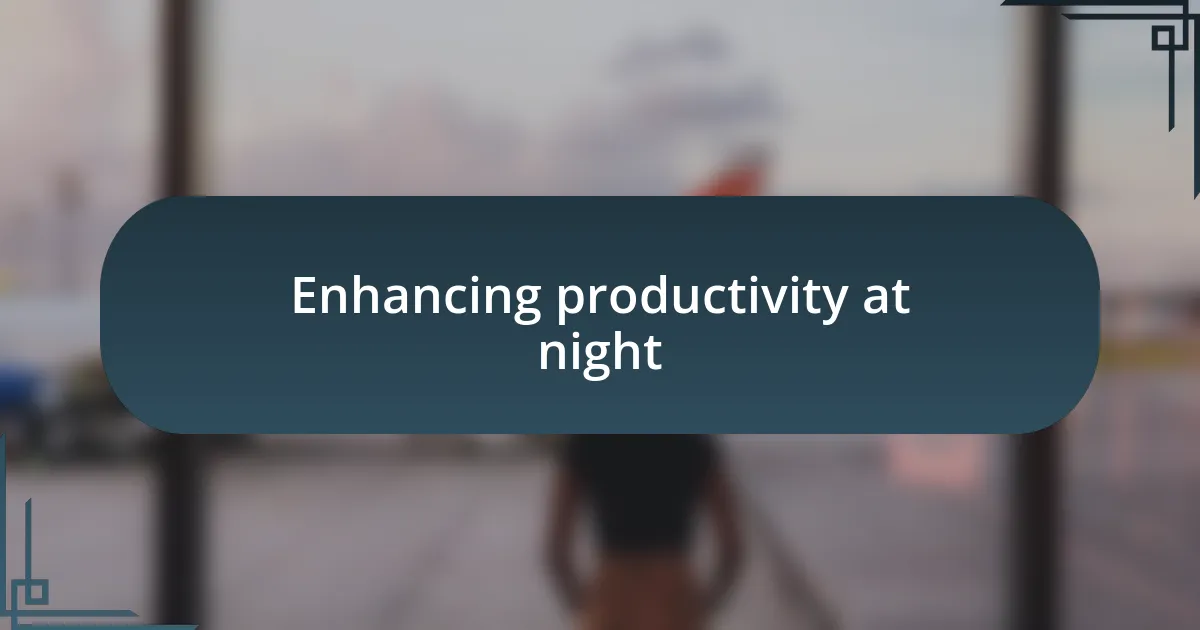Key takeaways:
- Night shifts can create a sense of independence and offer higher pay, but they also lead to challenges such as sleep deprivation and social isolation.
- Improving sleep quality involves creating a conducive environment, establishing a consistent routine, and making nutritious food choices.
- Effective fatigue management includes taking strategic breaks, staying hydrated, and engaging in light conversations to maintain focus.
- Building social connections is possible through workplace engagement, online groups, and planning activities outside work hours, enhancing the night shift experience.

The benefits of night shifts
Working night shifts can surprisingly nurture a unique sense of independence. I remember my first week on the night shift; I felt a rush of freedom without the usual daytime distractions. It was as if I had carved out my own little world, where I could think more clearly and find my rhythm without the hustle and bustle surrounding me.
Night shifts often come with a higher pay rate, which is a substantial benefit I found. When I made the switch, my paycheck reflected that difference almost immediately. It presented an opportunity to save more and invest in things I genuinely wanted, like a spontaneous weekend trip or that new gadget I had my eye on for ages.
Moreover, my social life transformed. The unconventional hours encouraged me to seek out friendships with fellow night owls, creating a bond we shared over coffee breaks in the wee hours. It posed a question that lingered in my mind: can you truly connect deeper with others who understand your unique schedule? In my case, the answer was a resounding yes, as those friendships flourished in a way I hadn’t experienced before.

Challenges of working nights
Working night shifts is not without its hurdles. For me, one of the biggest challenges was managing my sleep schedule. I vividly recall feeling like a zombie on days off, unable to fully participate in activities with friends and family. The isolation that can come with being awake when others are asleep often left me grappling with a sense of loneliness.
Here are some challenges I encountered while working nights:
- Sleep Deprivation: Adapting to a nocturnal schedule disrupted my natural sleep cycle, leading to fatigue.
- Social Isolation: Missing out on daytime social events created a rift between me and my friends.
- Health Concerns: I noticed an increase in headaches and digestive issues, attributing them to irregular eating and sleeping patterns.
- Safety Risks: Traveling home when others are waking up made me more cautious, sometimes feeling unsafe in deserted streets.
- Family Dynamics: Balancing family time while being awake at odd hours strained relationships, causing awkward scheduling conflicts.
These challenges prompted me to rethink not just my work choices, but how I approached daily life in a newfound light. It took trial and error, but I gradually learned how to better manage these difficulties.

Improving sleep quality
Finding ways to improve sleep quality while working night shifts was a journey that took time and dedication. I discovered that creating a serene sleep environment made a significant difference. A dark room with blackout curtains and a white noise machine helped block out the disturbances of day-to-day life, allowing me to drift into sleep more easily. I remember the first time I woke up feeling genuinely refreshed—it was a game changer.
In addition to modifying my sleep environment, establishing a consistent sleep routine played a crucial role. I found that going to bed and waking up at the same time, even on my days off, helped regulate my body’s internal clock. At first, it felt strange, almost like I was imposing a schedule on myself. However, over time, I realized how much better I felt. I even started incorporating relaxation techniques, like deep breathing or light stretching, to ease into sleep more comfortably. Have you ever been surprised at how much a calming routine can enhance your sense of well-being?
Nutrition also factored into my sleep quality. Initially, I would grab anything quick during shifts, often caffeine-laden snacks to stay awake. As a result, I found myself restless in bed, tossing and turning. When I began prioritizing healthy meals and keeping my caffeine consumption to earlier in the day, I noticed a marked improvement in both my energy levels and sleep. Nutrition can sometimes feel overlooked, but I truly believe it’s a vital pillar of restful sleep.
| Sleep Improvement Strategies | Description |
|---|---|
| Sleep Environment | Using blackout curtains and white noise machines enhances sleep by reducing disturbances. |
| Consistent Sleep Routine | Going to bed and waking at the same time every day helps regulate the body’s internal clock. |
| Nutrition Choices | Eating healthy meals and reducing caffeine improves overall energy levels and sleep quality. |

Managing fatigue effectively
Managing fatigue while working night shifts can feel like a constant battle, but I’ve discovered that small adjustments can lead to significant changes. One technique I found beneficial is taking short, strategic breaks during my shift. I remember a night when I felt my eyelids getting heavy, so I allowed myself just a five-minute walk around the break room. It re-energized me surprisingly well! Have you ever noticed how a quick stretch or some fresh air can awaken your senses again?
Another essential strategy I’ve learned is staying hydrated. During my early nights, I often overlooked water in favor of caffeinated drinks, thinking that was the key to staying alert. However, I quickly realized that dehydration only added to my fatigue. Sipping water consistently throughout my shift made a remarkable difference in my overall energy. Have you ever considered how something as simple as water can boost your stamina?
Finally, I can’t emphasize enough the importance of mental breaks. Engaging in light conversations with coworkers, or even listening to a podcast for a few minutes, can work wonders. It not only distracts me from the fatigue but also reinvigorates my focus. I once chatted with a colleague about our favorite movies, and it not only took my mind off the tiredness but also left me feeling more connected. Don’t you think those little moments of joy can pave the way for better endurance?

Enhancing productivity at night
Enhancing productivity during night shifts has required some creative strategies on my part. One technique that has worked wonders for me is setting clear, achievable goals for each hour. I remember one particularly grueling night when I broke my tasks into 30-minute segments. Focusing on just one small task at a time kept me motivated, and the satisfaction of crossing items off my list boosted my morale. Have you ever found that small victories can fuel your progress throughout a long night?
Another approach I’ve adopted is creating a stimulating environment. For me, playing upbeat music quietly in the background has proven invaluable. I discovered this trick on a night when I was struggling to maintain momentum; as soon as my favorite playlist started playing, I felt an instant energy boost! Isn’t it fascinating how sound can elevate our mood and performance?
Moreover, I’ve realized that utilizing the night’s quieter atmosphere can lead to deeper concentration. When most of the world is sleeping, distractions are minimal, allowing me to focus intently on my projects. Recently, I dove into a challenging report at a time when the office was nearly silent, and I completed it much faster than usual. Have you ever found that solitude enhances your productivity?

Building social connections
Building social connections during night shifts may seem challenging due to the unconventional hours, but I’ve found that it’s entirely possible. In my early nights, I made a point to engage with my coworkers during breaks, sharing stories and laughter. This simple act of connection created a sense of belonging that made the long hours feel less isolating. Have you ever experienced how a friendly conversation can lift your spirits, even when the clock seems to drag?
Another approach I discovered was joining shift-specific social groups, often through online platforms. Connecting with others who shared my night shift experience helped me not only learn from their strategies but also foster friendships. I still remember the late-night chats where we exchanged tips on managing fatigue and swapped funny stories about night shift mishaps. It was eye-opening to realize that others understood the unique challenges we faced.
I also learned the value of planning social activities outside of work hours. Organizing occasional get-togethers with my night shift coworkers allowed us to build relationships beyond the confines of the workplace. The first time we gathered for a brunch after a night shift, I felt a wave of camaraderie that transformed our work dynamic. Have you ever found that sharing experiences outside of work solidifies relationships? It certainly did for me, making the long nights more enjoyable and rewarding.

Long term impacts on health
The long-term impacts of working night shifts on health are significant and often underestimated. Personally, I noticed various effects over time, particularly with sleep quality. Initially, I thought I could adapt to irregular hours, but chronic sleep disruption led to consistent fatigue and an overall decline in energy. Have you ever felt the weight of exhaustion linger longer than it should? For me, it became a day-to-day struggle.
Another health impact I realized was the risk of metabolic changes. While I attempted to maintain a balanced diet during those hours, my eating patterns shifted. Late-night snacking became a habit, often leading to weight gain and increased cravings for unhealthy options. It’s fascinating to me how our bodies can react to such shifts in routine. Have you considered how your dietary choices might change when your schedule flips upside down? I certainly found it challenging to keep my nutrition on track.
Moreover, the mental health effects are profound and shouldn’t be overlooked. Consistent night shifts can contribute to feelings of isolation and even mild depression. I remember instances where the solitude of working through the night would weigh heavily on my mind. Feeling disconnected from the world during those hours fostered a sense of loneliness I hadn’t anticipated. Have you experienced something similar? I believe acknowledging this reality is crucial for anyone considering the long-term implications of their working hours.











